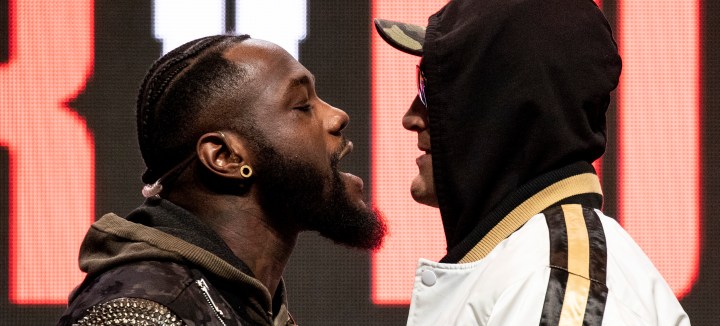Boxing
Fury shifts bout’s focus to the broader issue of mental health

This weekend’s World Boxing Council (WBC) heavyweight clash between Deontay Wilder and Tyson Fury harks back to the glory days of the division. But unlike the brutal fight game of other eras, profound issues confronting boxers have been brought to the fore by Fury’s public mental health battle.
Deontay Wilder and Tyson Fury will stage a rematch of their epic 12-round draw from December 2018 when they clash in Las Vegas in the early hours of Sunday morning (SA time). If the fight comes close to the quality, courage and drama of the first bout, the two fighters will move into boxing folklore.
It pits two of the heavyweight division’s best and most marketable fighters against each other for a second time. Both are undefeated – the 2018 draw being the only blemish on their records – and both are widely regarded as fighters who have saved a division that has languished since Mike Tyson exited the sport more than two decades ago.
Heavyweight boxing has always been the division that measures the temperature of the sport and for much of the 21st Century it has been tepid and unwell.
A succession of mediocre heavyweight champions have come and gone, while the sport itself has faced increasing pressure because of its chequered record of protecting its main protagonists – the fighters. No sport is as littered with tragic rags-to-riches-to-rags tales as boxing.
Fighters almost all come from tough upbringings in poor areas where the sport offers a way out. Fury and Wilder are no different. What remains to be seen is if they return to their humble origins once their time in the ring is over.
“In my experience, all boxers come from poor, tough backgrounds. You don’t find middle-class kids who become great fighters,” top South African trainer Colin Nathan told Daily Maverick.
“Generally, the tougher the environment a kid comes from, the harder the boxer. And as a trainer, that’s what I want.”
But Nathan is not tone deaf to issues in boxing and understands the growing need for a conversation about mental health in the sport, which has been aided by Fury’s forthright and honest assessment of his own issues.
“Tyson Fury has come back from the brink and you have to respect that,” He had drug issues and mental health issues and has overcome them,” Nathan said.
“As a trainer I’m certainly more aware of mental health issues around the sport these days. They usually manifest the most when boxers are about to retire or have to retire.
“Fighters in their peak were adored by fans and they have to accept a life of change when that adoration will be gone. They don’t know how to deal with that and that’s why a lot of them turn to alcohol and drugs.
“It’s a massive problem, but we are in a better place. Thirty years ago, the sport wasn’t aware of mental health issues but today we are. Inevitably, when I sit a fighter down and tell him it’s time to retire, there is some unhappiness.
“But because I’m honest and put them first, I haven’t had to confront mental health problems in a significant way.”
Fury, who surprised the world when he out-boxed Wilder for large parts of their first fight and survived two knockdowns to earn a draw, spoke eloquently of his mental health battles in the immediate aftermath of the first fight.
“It’s not been any secret what I’ve been doing out of the ring,” Fury said. “I’ve been living like a rock star. That ain’t a great thing, by the way, because I’ve had a very low time doing it. I’ve fought back from suicide and mental health [issues] and depression and anxiety. And I wanted more than anything tonight to show the world that it can be done. Anything is possible with the right mindset.”
In the build-up to the second fight, Fury reiterated his ongoing fight with his emotions and mentality despite the fame and fortune that has come his way through the sport.
“I hate Sundays,” Fury told the Guardian this week. “I take Sunday off. It’s always a slow, long day for me, Sunday. It’s [depression] an ongoing concern. And it will be until the day I die. It’s not something you can cure. It’s something that stays with you and will always come back. But, as long as you keep a routine life and healthy living, I think you’ll be okay.”
Wilder, who had shown maturity and respect in not using Fury’s mental health problems as a weapon in the verbal sparring prior to the fight, finally went below the belt at the official weigh-in on Wednesday.
The two faced off for over five minutes and there was some pushing and shoving before security stepped in. In boxing, the weigh-in has become part of the show, and Wilder played his part.
“Don’t you ever forget that when I found you, you were strung out on coke,” Wilder taunted Fury. “You were like a big house, contemplating killing yourself. Don’t you ever forget who brought you to big-time boxing. I brought you back, dragged you back, I put food on your table for your family to eat and I’m doing it again for a second time. I’m the one who sells the pay-per-view and tickets. They come to see me.”
The trash-talking is one of the many ugly sides of the sport but also an accepted part of the show. And make no mistake, boxing at the highest level is a show with millions of dollars on offer through pay-per-view television.
Big fights have to be hyped and marketed so that subscriptions are purchased. The more they sell, the more money each boxer earns. But the show can never mask the naked honesty of boxing. There are few sports or pastimes where the participants face the real prospect of death at worst, or maiming and severe pain at least.
“I get asked often by people, ‘how on earth can you be involved in such a barbaric and brutal sport’,” Nathan said. “My answer is simple. Boxing is about choice and boxing saves lives.
“We know the dangers when fighters step into the ring. Fighters put their lives on the line when they climb through the ropes. But it also gives them an opportunity out of a life of poverty that they otherwise wouldn’t have had. It literally allows them to make something of their lives.
“You can’t dispute that boxing is brutal and barbaric but it is also the most honest, beautiful and pure sport on so many levels. You can’t run away from the truth in boxing. It’s always there in front of the fighter.”
Boxing is the sporting embodiment of an elemental human condition to defend themselves or conquer another.
“I still go around and help kids in poverty-stricken areas through boxing,” former middleweight great Marvin Hagler told me at the Laureus World Sports Awards in Monaco in 2019.
“What I look out for is where kids are being bullied in school. And not just in America, but all around the world. I encountered this in Naples recently too. It’s really sad to see the effect it has on kids.
“I’m not advocating that kids should go and whack the bullies in return but I’m teaching them some boxing skills to give them confidence. When they have that confidence, they can front up to the bully and make him back down because he will have cowardice in him.
“It all starts young and in my opinion your best defence is a good offence. Learning boxing or any kind of self-defence, is important for kids and their self-confidence.
“I was bullied as a kid and I remember that feeling of helplessness. I was just lucky that I went into the gym and found a trainer who told me not to take boxing out into the street and use it negatively.”
This weekend Wilder and Fury will certainly be using their boxing skills to punish the other man, but when it’s over they might have struck a few positive blows for mental health in boxing as well. DM




















 Become an Insider
Become an Insider